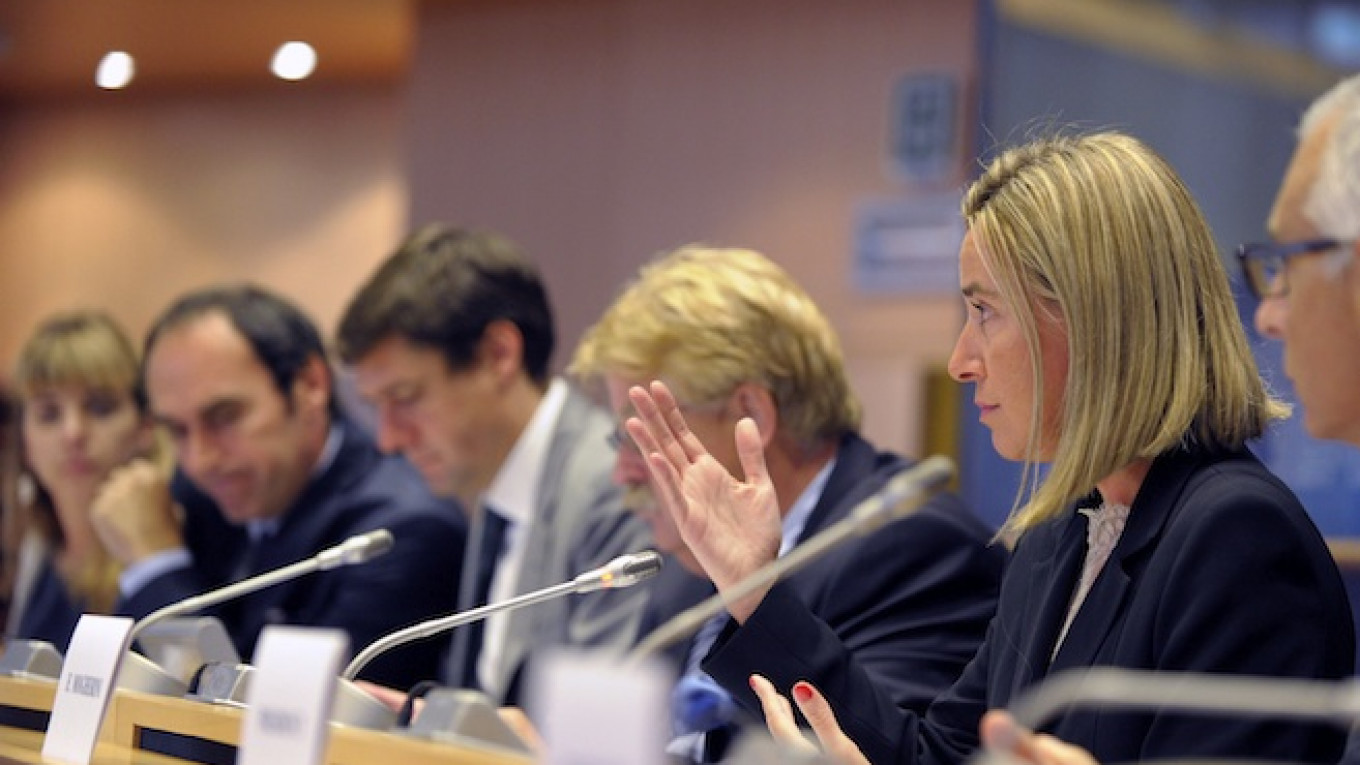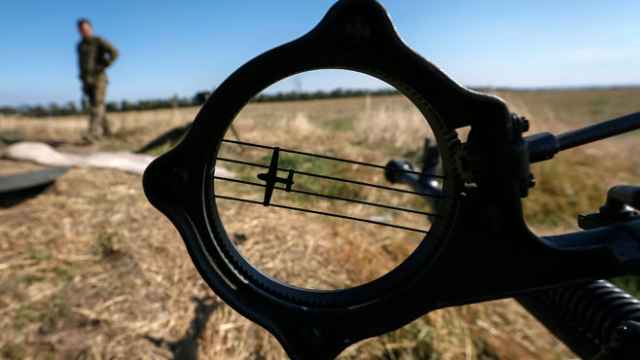BRUSSELS/DONETSK, Ukraine — EU officials have proposed sanctions to starve Russian firms of cash as punishment for Moscow's role in Ukraine, where rebels said they were storming Donetsk airport, potentially their biggest prize since turning the war's tide last week.
Western countries accuse Moscow of sending armored columns of troops into Ukraine, where the momentum in a five-month war shifted last week decisively in favor of pro-Russian rebels, who are now advancing on a new front towards a major port.
Russia denies its troops are involved in fighting on the ground, in the face of what Western countries and Ukraine say is overwhelming evidence.
In Washington, Pentagon spokesman Rear Admiral John Kirby estimated there were thousands of Russian forces inside Ukraine.
"You want to talk provocative? Let's talk about a few thousand Russian troops inside eastern Ukraine, continuing to support separatists, with heavy weapon systems, and more than 10,000 troops arrayed along the southeast border with Ukraine," Kirby told a news briefing on Tuesday.
Rebels in Donetsk, the biggest city under their control, said they were close to recapturing its airport from Ukrainian troops who had defended it since capturing it two months ago.
"The airport is 95 percent under our control. Practically, we are holding it by now. Some remaining Ukrainian troops need to be cleared," said Alexandar Timofeyev, a leader of one of the main rebel units in Donetsk. "The Ukrainian army is retreating. It's more of a flight by now. Reasonable ones give up their weapons and go. Others stay in the ground for good."
A rebel source said an attempt to storm the airport was under way: "It will soon be over."
Losing control of the airport in Donetsk would be a humiliating reversal for government forces that recaptured it after going on the offensive in June. Ukrainian forces abandoned the airport at the other rebel stronghold, Luhansk, on Monday.
European leaders asked the EU on Saturday to draw up new sanctions to punish Moscow, which are expected to be unveiled on Wednesday and adopted by Friday. The U.S. is also planning new sanctions but is keen to maintain Western unity by not getting in front of its European allies.
Outlining the new proposals on Tuesday, European diplomats described a number of mainly technical measures that would have the combined effect of making it harder for companies in Russia's state-dominated economy to obtain overseas financing.
U.S. and EU sanctions steadily tightened since March have already made it hard for many Russian firms to borrow, scaring investors and contributing to billions of dollars in capital flight that has wounded the Russian economy. Moscow has responded by banning most imports of Western food.
"We need to respond in the strongest possible way," said the EU's newly named incoming foreign policy chief, Italian Foreign Minister Federica Mogherini. "Things on the ground are getting more and more dramatic. We speak of an aggression, and I think sanctions are part of a political strategy."
A summit of European leaders, which will be followed later this week by a NATO summit in Wales, has been dominated by events in Ukraine, against a backdrop of increasingly defiant statements by Russian President Vladimir Putin.
According to Italy's La Repubblica newspaper, outgoing European Commission President Jose Manuel Barroso said Putin had told him he could take Ukraine's capital within two weeks if he wanted to. The Kremlin said any such remarks would have been taken out of context, and criticized Barroso for the leak.
Last week, Putin compared the Kiev government to Nazis and said foreigners needed to understand that Russia was a nuclear power and "it's best not to mess with us." On Sunday, he said Kiev needed to negotiate "statehood" for its south and east.
Sanctions
Still, it is by no means clear that the sanctions will pass in their proposed form: the 28 EU member states must all agree on any measures, and several have openly expressed skepticism
Czech Prime Minister Bohuslav Sobotka said he would study ways to reduce the harm to his country from sanctions, and seemed unconvinced by the entire strategy.
"The problem is that if sanctions are escalated now, there will be a reaction from Russia and we are not able to estimate at this point what impact the next wave of sanctions by Russia against EU countries will have," he said.
Slovak Prime Minister Robert Fico has also expressed concern, calling sanctions "meaningless and counterproductive".
The measures described by EU diplomats all build on earlier sanctions imposed in July, which hit Russian business broadly for the first time.
The new proposals on the table would widen a ban on Russian state banks raising capital in EU markets to cover all Russian state-owned firms. The capital markets borrowing ban would be extended to include syndicated loans from EU banks, and a ban on sales in Europe of Russian debt instruments for periods of less than 90 days would be reduced to 30 days.
Bans on sales of energy technology and technology with dual military and civilian uses would be tightened. And the 28-member bloc could also consider more symbolic measures, like adding Russia's defense minister to an EU travel ban list and possibly even limiting future sport and culture exchanges.
The EU also opened a pipeline that could supply Ukraine with 20 percent of its natural gas needs, important aid for a country that depends on Russian energy. Kiev has been burning gas reserves since Moscow cut it off two months ago.
The International Monetary Fund, which is supporting Kiev with loans, said it would need a bigger bailout if war goes on.
A Message from The Moscow Times:
Dear readers,
We are facing unprecedented challenges. Russia's Prosecutor General's Office has designated The Moscow Times as an "undesirable" organization, criminalizing our work and putting our staff at risk of prosecution. This follows our earlier unjust labeling as a "foreign agent."
These actions are direct attempts to silence independent journalism in Russia. The authorities claim our work "discredits the decisions of the Russian leadership." We see things differently: we strive to provide accurate, unbiased reporting on Russia.
We, the journalists of The Moscow Times, refuse to be silenced. But to continue our work, we need your help.
Your support, no matter how small, makes a world of difference. If you can, please support us monthly starting from just $2. It's quick to set up, and every contribution makes a significant impact.
By supporting The Moscow Times, you're defending open, independent journalism in the face of repression. Thank you for standing with us.
Remind me later.






